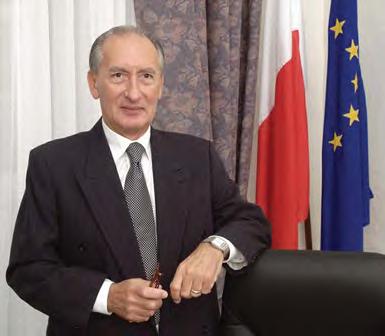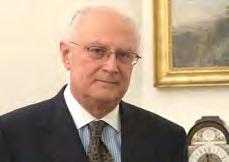
6 minute read
Chairman’s Statement
by MITA
Joseph R Grima
This is the final occasion on which it is my privilege to write a foreword to a MITTS Ltd annual report. In January 2005 I am stepping down as Head of the Public Service and as Chairman of MITTS Ltd. These two roles are closely interlinked because of the core function of MITTS Ltd, which remains that of supporting change in the Public Service through the exploitation of information and communications technology.
I have been a member of the board of directors of MITTS Ltd since the incorporation of the company in November 1990. I have served as Chairman for these last eight years. Key achievements during these years include the development and upgrading of the Malta Government Network; the introduction of e-mail and its diffusion throughout the Public Service as from 1996; the preparations for Y2K, a largely forgotten event today but one which represented a major exercise in contingency planning and precautionary work; the development of a major presence for the Public Service on the Internet, with 56 ministry and departmental websites in addition to the main portal (www.gov.mt); the introduction of transactable e-government services; and, more recently still, the development of information security procedures and expertise.
It is no exaggeration to say that, with the support of MITTS Ltd, the Public Service has gone through a silent revolution. Every single back office process in Government departments is dependent on information technology. If, today, Malta’s progress towards the objectives of “eEurope” compares very well with those of other EU member states, this is in considerable measure thanks to MITTS Ltd.
However, constant change in the Public Service has been matched by constant change on the part of MITTS Ltd itself — to develop new areas of expertise in line with the needs of its client, to keep up with technological change, and to maintain its strengths at a time when the rapid expansion of the local IT industry was leading to fast staff turnover.
MITTS Ltd succeeded in fulfilling its mission and in adapting itself to meet new requirements thanks to the excellence of its management team and the commitment of its workforce. The company kept its staff on board throughout the constant internal changes, without compromising its pursuit of high standards. Care was taken to limit the damage caused by change; there was no chopping and changing for its own sake; values were constantly promoted and targets were set, but time was also taken to appreciate the efforts and attributes of staff and to give credit to their achievements. The investment of time and patience has proved to be the cornerstone of successful change management.
Another cornerstone of a well-run company is a proper understanding by key players — senior management, the directors, the Chairman — of their respective roles. The Chairman should refrain from constant involvement in day-to-day management. Yet he should remain alert to the need to intervene and be quick to do so when necessary.
As Chairman I did not hesitate to take tough decisions when these were needed, or to intervene where I could add value to the company. Examples of such interventions include the development of contacts with the UK and Canada which enabled MITTS Ltd staff to exchange experiences with their overseas counterparts, or the commissioning of a technology audit which proved particularly useful as an independent yardstick by which to set future directions. However, these were interventions by exception. I regarded my most important role as Chairman as that of sustaining the company in times of difficulty and acting as a source of stability in the best interests of the Government (as shareholder of the company), the staff and the Public Service.
My other role of Principal Permanent Secretary also influenced my conduct as Chairman, as it should have. I was concerned with upholding the core role of MITTS Ltd, of facilitating the exploitation of information and communications technology as a tool to improve efficiency and service quality within the Public Service. This core role has not always been widely understood. It came under searching scrutiny more than once in the company’s short history. However, these turbulent periods had the benefit of compelling us to rethink our mission and refocus on our priorities.
Today MITTS Ltd is backed in the fulfilment of its core role by the Central Information Management Unit within the Office of the Prime Minister and by Information Management Units within ministries. These offices effectively define the requirements which MITTS Ltd should fulfil on the Public Service’s behalf, and in so doing ensure that the goal of exploiting ICT is internalised within ministries.
MITTS Ltd has overcome various challenges, but it will no doubt face new ones as times change. The successes achieved within the Public Service need to be replicated within the wider public sector. MITTS Ltd is well placed to take the lead in this endeavour, even as it sustains its activities within the Public Service. In the longer term, MITTS Ltd will need resourcefulness to continue to prosper as a strong company within a changing environment; yet again this search for new opportunities and activities should not displace the focus on its core role.
I have every confidence in the company’s ability to meet the challenges of the future. It has a strong management team and a committed workforce. It is with pride and great satisfaction that I leave MITTS Ltd in the shape it is today.
I wish to record my profound appreciation for the support I have received over the years from other board members, who gave of their best and who proved a valuable resource for me and for the company. I am equally indebted to the management and staff in MITTS Ltd for their professional ability, loyalty and commitment to the company. The company, and the country, owes them all a great deal.

Joseph R Grima Chairman


Directors: Joseph W Izzo, Elizabeth Micallef
evolution and growth

Throughout the history of humanity the human race has survived and developed by evolving and changing, constantly improving from the original prototype of the human species going through a life cycle process much akin to a complete metamorphosis.
Just like the simple butterfly, a highly adaptable species whose life cycle encompassed the stages of hatching, larva, pupa and fully-fledged adulthood.
Humans also go through a growth process embracing foetal growth, birth, youth and adulthood. Such a process equips them for adapting and surviving in a complex and competitive world which mirrors nature in many respects.
In today’s commercially diverse world, organisations like MITTS Ltd must also change to adapt in a highly complex environment, developing their organisational talent to ensure sustainability and commercial success without which their very existence would be jeopardised and their continuity curtailed.










